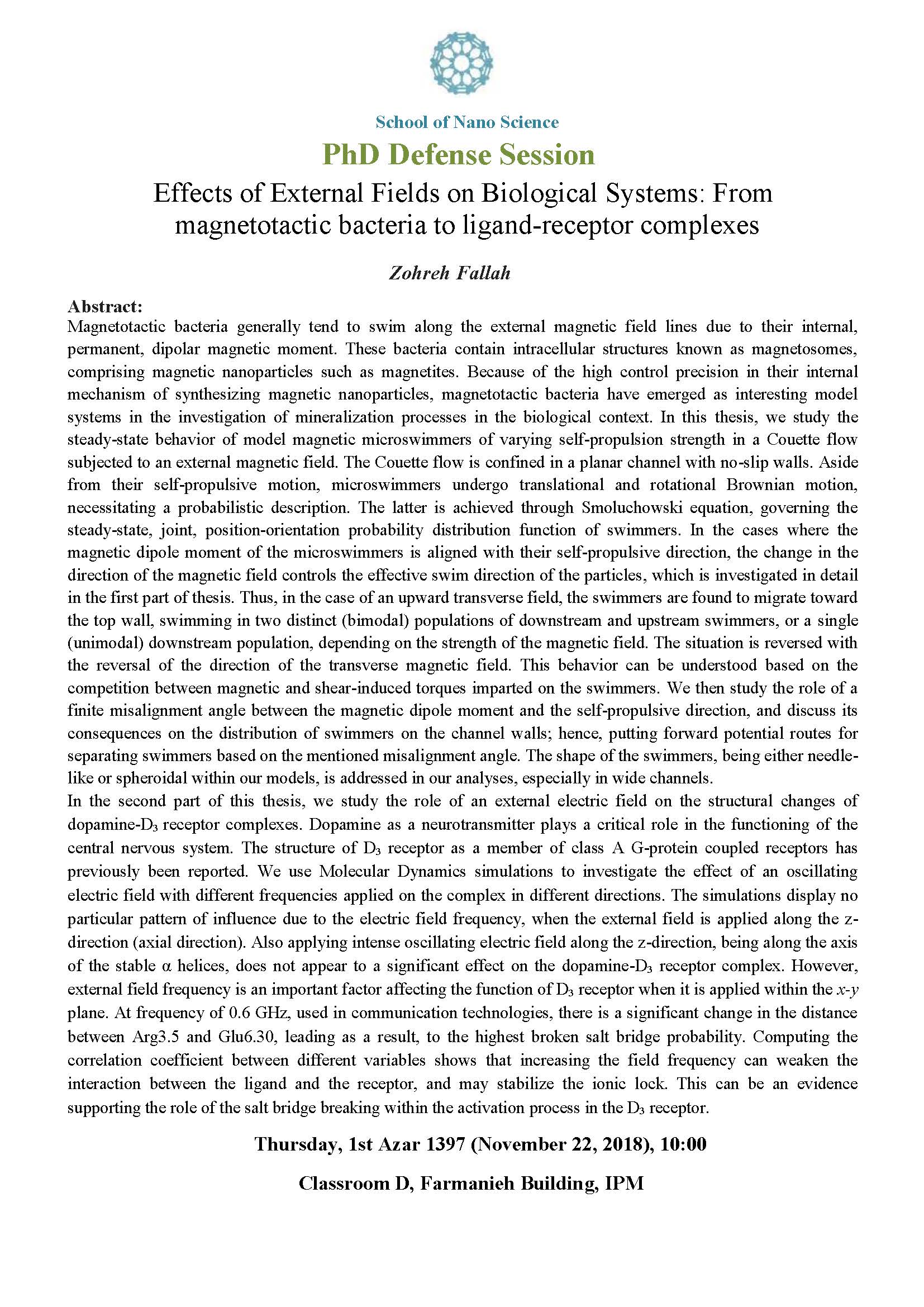| | اثر میدان خارجی بر سیستم های زیستی: از بکتری های مغناطیسی تاکمپلکس های لیگاند-گیرنده
Abstract:
Magnetotactic bacteria generally tend to swim along the external magnetic field lines due to their internal, permanent, dipolar magnetic moment. These bacteria contain intracellular structures known as magnetosomes, comprising magnetic nanoparticles such as magnetites. Because of the high control precision in their internal mechanism of synthesizing magnetic nanoparticles, magnetotactic bacteria have emerged as interesting model systems in the investigation of mineralization processes in the biological context. In this thesis, we study the steady-state behavior of model magnetic microswimmers of varying self-propulsion strength in a Couette flow subjected to an external magnetic field. The Couette flow is confined in a planar channel with no-slip walls. Aside from their self-propulsive motion, microswimmers undergo translational and rotational Brownian motion, necessitating a probabilistic description. The latter is achieved through Smoluchowski equation, governing the steady-state, joint, position-orientation probability distribution function of swimmers. In the cases where the magnetic dipole moment of the microswimmers is aligned with their self-propulsive direction, the change in the direction of the magnetic field controls the effective swim direction of the particles, which is investigated in detail in the first part of thesis. Thus, in the case of an upward transverse field, the swimmers are found to migrate toward the top wall, swimming in two distinct (bimodal) populations of downstream and upstream swimmers, or a single (unimodal) downstream population, depending on the strength of the magnetic field. The situation is reversed with the reversal of the direction of the transverse magnetic field. This behavior can be understood based on the competition between magnetic and shear-induced torques imparted on the swimmers. We then study the role of a finite misalignment angle between the magnetic dipole moment and the self-propulsive direction, and discuss its consequences on the distribution of swimmers on the channel walls; hence, putting forward potential routes for separating swimmers based on the mentioned misalignment angle. The shape of the swimmers, being either needle-like or spheroidal within our models, is addressed in our analyses, especially in wide channels.
In the second part of this thesis, we study the role of an external electric field on the structural changes of dopamine-D3 receptor complexes. Dopamine as a neurotransmitter plays a critical role in the functioning of the central nervous system. The structure of D3 receptor as a member of class A G-protein coupled receptors has previously been reported. We use Molecular Dynamics simulations to investigate the effect of an oscillating electric field with different frequencies applied on the complex in different directions. The simulations display no particular pattern of influence due to the electric field frequency, when the external field is applied along the z-direction (axial direction). Also applying intense oscillating electric field along the z-direction, being along the axis of the stable α helices, does not appear to a significant effect on the dopamine-D3 receptor complex. However, external field frequency is an important factor affecting the function of D3 receptor when it is applied within the x-y plane. At frequency of 0.6 GHz, used in communication technologies, there is a significant change in the distance between Arg3.5 and Glu6.30, leading as a result, to the highest broken salt bridge probability. Computing the correlation coefficient between different variables shows that increasing the field frequency can weaken the interaction between the ligand and the receptor, and may stabilize the ionic lock. This can be an evidence supporting the role of the salt bridge breaking within the activation process in the D3 receptor.
سخنران:زهره فلاح
زمان:
1 آذرماه 1397 ساعت 10:00
مکان:
تهران- خیابان شهید لواسانی (فرمانیه)- بین کامرانیه و دیباجی - نبش کوچه شهید محمد فربین - پژوهشگاه دانشهای بنیادی - طبقه دوم- کلاس D .
 | |
|

